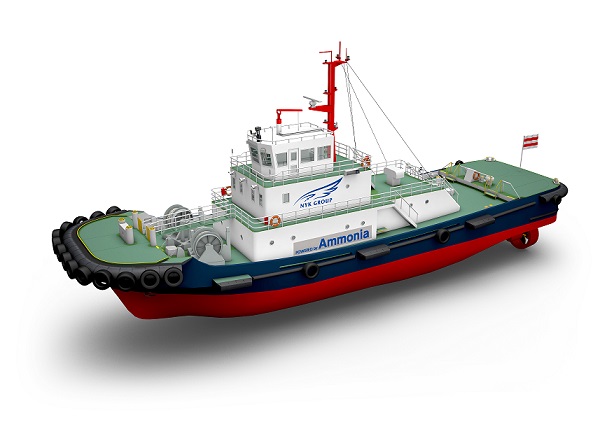Jul. 12, 2022
Ammonia-Fueled Tugboat Obtains AiP from Classification Society ClassNK
Step Forward toward Realization of a Zero-Emission Ship
NYK Line
IHI Power Systems Co., Ltd.
On July 11, NYK Line and IHI Power Systems Co., Ltd. (IPS) obtained AiP (Approval in Principle) from Japanese classification society Nippon Kaiji Kyokai (ClassNK) for an ammonia-fueled tugboat currently being jointly researched and developed. This is the world's first tugboat using ammonia as fuel has obtained AiP from ClassNK.
This R&D is part of the Green Innovation Fund project within Japan’s New Energy and Industrial Technology Development Organization (NEDO) for the development of vessels equipped with a domestically produced ammonia-fueled engine, adopted in October 2021 for NYK Line and IPS.*
Since carbon dioxide (CO2) is not emitted when ammonia is combusted, ammonia is viewed to have promise as a next-generation fuel that could mitigate shipping’s impact on global warming. In addition, it is said that zero emissions can be realized considering even the fuel life cycle by utilizing CO2-free hydrogen** as a raw material for ammonia.
By using ammonia as a fuel for ships, it will be possible to significantly reduce greenhouse gas (GHG) emissions during voyages. Therefore, the companies are proceeding with research and development aiming for early social implementation.
The main design issues when using ammonia as a fuel during development are as follows.
1. It is necessary to combust ammonia stably and operate the engine while increasing the usage ratio of ammonia, which is flame-retardant and has low energy density.
2. Since the combustion of ammonia generates nitrous oxide (N2O: about 300 times the warming potential of CO2) instead of CO2, it is necessary to control the combustion to prevent the generation of nitrous oxide and not to discharge it overboard.
3. A design to prevent leakage of toxic ammonia and adequate safety measures in the event of leakage. Safety measures based on risk assessment are necessary to ensure the same level of safety as conventional vessels.
For this AiP, NYK Line and IPS attempted a design to safely and practically install ammonia fuel-related equipment in a limited space on board by developing an ammonia fuel engine, selecting equipment, and devising the equipment layout in the design. As a result, the companies have achieved the design of A-Tug, which overcomes the above challenges without changing the size of a conventional tugboat.
The parties obtained the AiP after a prescribed examination by ClassNK. In the future, the companies will work toward the realization of a demonstration operation at the port of Yokohama in fiscal 2024 through further studies for construction.

Image of A-Tug

Hand-over ceremony
From left,
Masaki Matsunaga, Corporate Office/Director of Plan Approval and Technical Solution Division, ClassNK
Toshi Nakamura, Executive Officer, NYK Line
Yuichi Tamura, Division Director/Engineering & Technology Center, IHI Power Systems Co., Ltd.
※Face masks were removed immediately prior to the photo.
Schedule

Overview of each company
<NYK Line>
Headquarters: Tokyo
President: Hitoshi Nagasawa
Website: https://www.nyk.com/english/
<IHI Power Systems Co., Ltd.>
Headquarter: Tokyo
President: Masao Akamatsu
Website: https://www.ihi.co.jp/ips/english/index.html
Inquiries
NYK Line
Corporate Communication Group, Media Relations Team
Telephone: +81-3-3284-5177; email: NYKJP.ML.MEDIA@nykgroup.com
IHI Power Systems Co., Ltd., Administration Division
Telephone: +81-3-4366-1203; email: ips-webmaster1@ihi-g.com
Overview of NEDO project
This project is being implemented with the support of NEDO. Please refer to the following URL for an overview of the project.
* Green Innovation Fund project
A 2 trillion yen fund created in NEDO to significantly accelerate current efforts such as structural transformation of the energy and industrial sector and innovation through bold investment toward carbon neutrality by 2050. The fund provides continuous support from R&D and demonstration to social implementation for up to 10 years for companies that share ambitious and concrete goals with the public and private sectors and tackle them as management issues. NEDO provides support mainly in 14 priority areas for which action plans are being formulated in the green growth strategy.
** CO2-free hydrogen
One way of producing hydrogen without generating CO2 is through the use of renewable energy. A second way is by using natural gas or coal together with carbon capture and storage. CO2-free ammonia synthesis is technology for synthesizing ammonia using such CO2-free hydrogen.

The news on this website is as of the date announced and may change without notice.